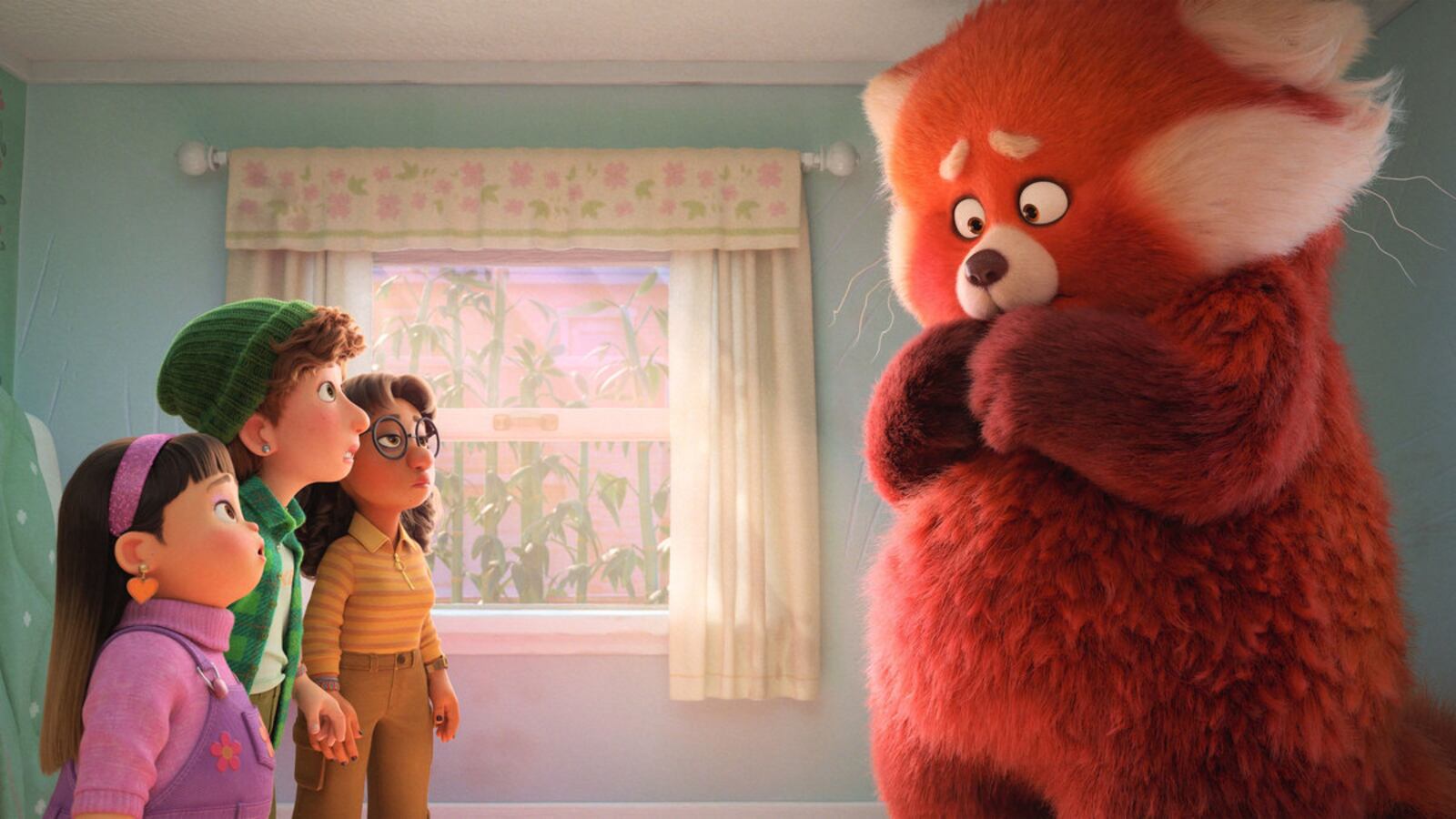In the world’s latest attempt to ruin all fun, Turning Red has somehow become one of the most controversial films of 2022. Domee Shi’s new coming-of-age film, which follows a young girl cursed with transforming into a giant panda, has the inquisitive delightfulness of Lady Bird paired with the flawlessness (and completely family-friendly image) of Pixar. And yet, here we are, wading through discourse yet again to protect poor Meilin Lee (Rosalie Chiang), part-time spunky middle schooler, part-time fluffy red beast, from people who can’t manage to have a good time—or, in fact, understand the purpose behind the movie in the first place.
The new animated movie has faced an abundance of controversies. Like young girls justifying their love for Twilight or Justin Bieber, fans of Turning Red face the wrath of angry parents and confused men taking their spite to Rotten Tomatoes over a few scenes in the film. This—shaming energetic teenage girls for their passions—is precisely what Turning Red proves unhealthy.
In simple terms, Turning Red is a near-perfect film.
Controlled by her mother (Sandra Oh) and beloved by her trio of friends, Mei is a delightfully perky middle school girl with perfect grades, dedication to her family, and an obsession with gyrating boy bands. When her desire for boys becomes too strong to handle, she spirals out of control—and into a giant red panda. This isn’t uncommon, though: it’s a tradition the Lee family has faced for centuries; all Mei has to do is harness the beast until she can perform a ritual to expel it.
Mei’s cheery personality is paired with a quick moving, smart plot jam-packed with 2000’s nostalgia, sizzling bowls of delectable food ladled into every scene, and meticulous attention to detail (for example, something I just found today: Mei’s pal Priya is obsessed with vampires, and mimics them in nearly every scene of the film). It steers away from clichés, marching to the beat of its own drum. There’s even a level of Spinal Tap greatness in the form of the film’s fake boy band, 4Town, with buoyant tunes from Billie Eilish and Finneas O’Connell.
How did this delight face such a hard time? Though not unique to Turning Red, the first major dilemma was Disney’s decision to send this gold mine straight to streaming. Soul and Luca have fallen to this tactic as well, a decision that has resulted in rightful backlash from Pixar workers. Theaters should be buzzing with thrilled children—this is a kids’ movie parents actually should like, too—candy in hand, ready for the time of their lives. (That’s not to say the film didn’t deserve a simultaneous streaming release, especially since kids under five still can’t get vaccinated.)

When first reviews started pouring in for the film, however, things seemed to be turning around. The movie, which now stands at a fantastic 95 percent “fresh” rating from critics on Rotten Tomatoes, was praised for a fresh take on puberty, stellar voice acting, and signature Pixar imagination. But that didn’t stop a few critics from shaming the movie for being “exhausting,” for creating a character that’s “irritatingly obnoxious,” and over its scenes featuring periods, which, god forbid, may prompt questions from confused children.
A since-deleted, terribly negative review hailed from CinemaBlend. “By rooting Turning Red very specifically in the Asian community of Toronto, the film legitimately feels like it was made for Domee Shi’s friends and immediate family members, which is fine,” the review wrote, “but also, a tad limiting in its scope.” The reviewer was dragged all over social media for the insensitive, racist undertones of his statements, and later, the piece was deleted. But another review left up by the Chicago Sun-Times denounces Turning Red’s discussions about puberty, saying that kiddos “might have questions.” Uh, hello: that’s the point. If your kid is going to turn into a giant panda (or, more likely, go through any other bodily changes), they need to be ready.
“Some Pixar films are made for universal audiences,” the CinemaBlend review continued. “Turning Red is not.” If Turning Red isn’t universal, neither are the other films about family (The Incredibles, Finding Nemo), growing up (Inside Out, Toy Story 3) or friendship (Monsters Inc.). The last three Pixar films have featured a plot in which a human becomes an animal—Soul, Luca, and now Turning Red—which, at least to me, doesn’t feel universal in the slightest. Why anyone would shame Turning Red for this fact is bonkers. Have you ever been a rat in Paris teaching a dope how to cook?
Turning Red is a watershed moment for representation, and there’s no underselling what it’s meant for young girls to finally see someone who looks like them in a movie like this. To interpret a moment like that as liability to the film’s appeal reveals a grotesque lack of imagination, generosity, and empathy from a person whose demographic, for so long, was the only one represented.
What makes matters worse is how universal Turning Red actually is, minus the whole “transforming into a giant red panda” bit. Everyone goes through some form of puberty. To get through her puberty and family drama, Mei turns to her best friends, who she dreams up every time she anticipates a panda attack. Perhaps having friends could become a more universal concept with the folks denigrating this movie.
And then there’s the case of the film’s splotchy audience score on Rotten Tomatoes and pushback from parents online, thanks to Mei’s crushes on boys and her mother’s presentation of menstrual pads. One review bashes the film for including “adult topics like puberty and menstruation.” Another says that Turning Red is “not a movie for a kid” because the film “glorifies disobedience.” This is exactly the type of absurd helicopter parenting that forces kids into defiance—for chrissakes, here we are again, this is the exact plot of Turning Red.
Teenage girls are often shamed for their girlish desires, and it appears Turning Red is no stranger to this phenomenon. If a young woman’s passion is not childish or cheesy, it is in turn sexual. Mei and her friends’ infatuation with 4Town is silly, unrelatable, but when she pines after real boys, her love darkens into something that’s deemed forbidden, too sexual in nature. Mei’s vibrant spunk and overall thoughtfulness make her one of Pixar’s best characters yet. Those who write her off because she’s, what, a harmless teenage girl? They’re just missing out on the party.
And don’t even get us started on the sexism, misogyny, and retrograde gender panic behind the backlash to the film’s acknowledgment of a fact of life: girls have periods. That people are triggered to the point of review bombing—flooding sites with negative scores and reviews—Turning Red is juvenile. It is the year 2022, and tampons are still taboo? Come on.
Turning Red should have Finding Nemo levels of acclaim. Shi’s masterpiece should’ve raked in a boatload of money at the box office, sold millions of giant red pandas to little girls just like Mei, and inspired a full-blown 4Town album. But for some reason (see: racism, sexism, etc.), folks are stuck in their irate red panda state over this movie. Take some notes from Mei and cool it, guys!






